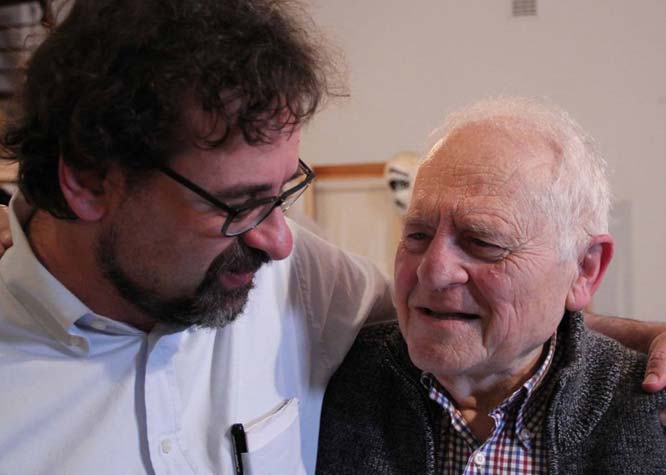 Francesco Lotoro
Francesco Lotoro
Ilse Weber, a Jewish poet, was imprisoned at the concentration camp at Terezin in German-occupied Czechoslovakia when she wrote a song called "When I Was Lying Down in Terezin's Children's Clinic."
The song was about caring for sick children at the camp where Weber worked as a nurse. She had little to no medicine available. But she had her poetry and her music - some of which her husband, managed to salvage by hiding the written verses in a garden shed after her death at Auschwitz in 1944.
"When I Was Lying Down" was among the songs he saved. For decades it was just lyrics on paper tucked away in storage, the song's melody unknown. But Italian musicologist and pianist Francesco Lotoro has devoted his life to unearthing thousands of songs and scores written during the Holocaust. Lotoro found the one person who remembered how it went: Aviva Bar-On, who, 70 years earlier, was Weber's patient as a 9-year-old girl.
On Sunday, Bar-On performed the song from memory before an audience of thousands in Jerusalem, including Israel's prime minister and dozens of fellow Holocaust survivors and their descendants. It was among 11 songs performed at the concert, called Notes of Hope, representing a mere snapshot of Lotoro's 30-year search for the music of the Holocaust. The concert, organized by the Jewish National Fund UK and conducted by Lotoro, marked Israel's 70th birthday.
In the decades leading up to this concert, Lotoro has cataloged symphonies, operas, scores and songs written on everything from coal sacks to toilet paper and by anyone who composed it in the captivity of a concentration camp: Jews, gypsies, prisoners-of-war. He has collected more than 8,000 pieces of music, with the goal of both preserving them for posterity and repairing a "gap" in music history, a time when innumerable composers were murdered in the Holocaust.
Since he started cataloging the music in 1989, he has traveled the world interviewing Holocaust survivors in search of missing melodies like the one 85-year-old Aviva Bar-On brought back to life.
"When I started out, this was mainly a passion," Lotoro told The Washington Post. "Now it's a mission."
Lotoro said that when he started searching 30 years ago, his focus was mostly confined to Jewish music composed in concentration camps. But the more he found, the more determined he was to expand his scope to include political or other religious prisoners. He was moved by the music that came from the Theresienstadt concentration camp at Terezin, where the Nazis would take many of the arts and culture luminaries, like Weber.
One such song was a nonet, a nine-instrument composition, by Rudolf Karel, who composed the score on toilet paper with medical charcoal before he died at Theresienstadt. It was among those played at Sunday's concert. Others included "Tango in Auschwitz," an upbeat dance number written by a 12-year-old Jewish prisoner and "But Facunge," written by prisoners in Auschwitz's gypsy camp, which asks listeners to "remember us, who were in Auschwitz." Many of the songs, Lotoro said, convey a sense of hope even in such desolate conditions.
"Out of this terrible experience came a melody, a hymn," he said.
Still, when visiting survivors who remember, he said the songs can at times be too painful to sing.
One man he visited several years ago started recalling the song sung by Polish Jews on a train bound for a concentration camp.
"I had to be careful, asking him to sing to me one, two, three or four times," Lotoro said. "Sometimes it can be hard for them. He remembered the melody. It was a beautiful melody, a fantastic melody. The melody gives it life."
When Lotoro first met Aviva Bar-On in Tel Aviv, he said it was months before she could remember Ilse Weber's song in its entirety. With each visit, he said, the more they talked, the more it came back to her.
"She was a wonderful, smiling lady," Bar-On said of Weber in an interview with The Guardian after the concert. "She played the mandolin and sang. Some of her songs were very funny. Now I'm the only one in the world who remembers them."
Bar-On said she spent time under Weber's care after falling ill. The concentration camp, she said, was full of "hunger, illnesses and epidemics."
"But the musical life of the camp was very rich," she told The Guardian. "There were famous opera singers and high-ranking musicians. There were lots of performances and a women's choir. We didn't know about the gas chambers. When people received the order to go to the train we didn't know where they were going."
Lotoro said that as the years have gone on finding survivors has become more difficult. He still has 10,000 additional records and tapes and files to sift through that are untouched and often thinks about all the rest that's still out there that has yet to be discovered. He doesn't intend to stop searching, he said, until he has uncovered "every little melody," whether from amateur musicians or professionals.
"We have to write the music of the last century," he said. "A lot of music, phenomenal music, was written during the war. This music has to be discovered. It belongs to humankind."


 Contact The Editor
Contact The Editor
 Articles By This Author
Articles By This Author